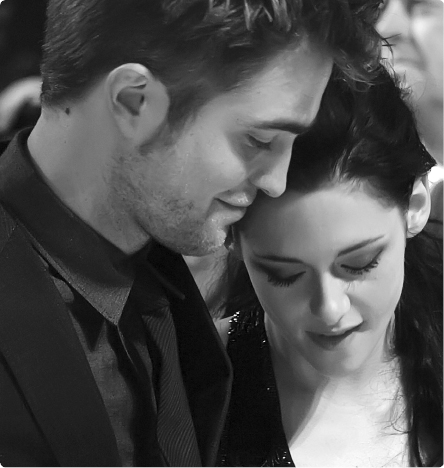Passion
When Bella first meets Edward in the book Twilight, she is confused, bewildered, and even angered by him and his unpredictable behavior. Over time, however, his ability to surprise her in pleasing ways, and his stunningly handsome appearance, feed a deepening attraction. Eventually, she learns that the passion she feels is mutually shared.

Kristen Stewart and Robert Pattinson’s on-screen romance as Bella and Edward in the Twilight films was mirrored by a romantic relationship offscreen.
MAX NASH/AFP/Getty Images
Passion is a blended emotion, a combination of surprise and joy coupled with a number of positive feelings such as excitement, amazement, and sexual attraction. Akin to Bella’s response to Edward, people who elicit passion in us are those who communicate in ways that deviate from what we expect (triggering surprise and amazement), whom we interpret positively (generating joy and excitement), and whom we perceive as physically pleasing (leading to sexual attraction).
Because passion stems in large part from surprise, the longer and better you know someone, the less passion you will experience toward that person on a daily basis (Berscheid, 2002). In the early stages of romantic involvements, our partners communicate in ways that are novel and positive. The first time our lovers invite us on a date, kiss us, or disclose their love are all surprising events and intensely passionate. But as partners become increasingly familiar with each other, their communication and behavior do, too. Things that once were perceived as unique become predictable. Partners who have known each other intimately for years may be familiar with almost all of the communication behaviors in each other’s repertoires (Berscheid, 2002). Consequently, the capacity to surprise partners in dramatic, positive, and unanticipated ways is diminished (Hatfield, Traupmann, & Sprecher, 1984).
Because passion derives from what we perceive as surprising, you can’t engineer a passionate evening by carefully negotiating a dinner or romantic rendezvous. You or your partner might experience passion if an event is truly unexpected, but jointly planning and then acting out a romantic candlelight dinner together or spending a weekend in seclusion cannot recapture passion for both you and your partner. When it comes to passion, the best you can hope for in long-term romantic relationships is a warm afterglow (Berscheid, 2002). However, this is not to say that you can’t maintain a happy and long-term romance; maintaining this kind of relationship requires strategies that we discuss in Chapter 10.
Self-Reflection
How has passion changed over time in your romantic relationships? What have you and your partners done to deal with these changes? Is passion a necessary component of romance, or is it possible to be in love without passion?
Question
Self-Reflection